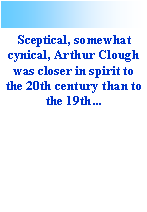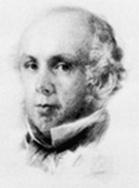



|
Poet’s corner |
|
born Jan 1, 1819, Liverpool, England died Nov 13, 1861, Florence, Italy The famous 19th century poet and scholar Arthur Hugh Clough. His work reflects the perplexity and religious doubt of mid-Victorian England. Sceptical, somewhat cynical, Clough was closer in spirit to the 20th century than to the 19th. He was born in Liverpool, England, on Jan 1, 1819 and educated at Oxford where he had intended to become a clergyman, but his increasing religious scepticism caused him to leave the university in 1848. He was educated at Rugby and Balliol College, Oxford, where he became friends with Matthew Arnold. After graduation (1841) he was fellow and tutor of Oriel College until 1848 when he resigned. During the next few years he travelled on the Continent. In 1852, inspired by his friendship with Emerson, he went to Harvard and lectured. He pursued a civil service career until his health failed in 1860. His first published work, The Bothie of Toper-na-Vuolich, a narrative in hexameters, appeared in 1848, followed by Ambarvalia, a collection of lyrics, in 1849. His posthumous poems include “Amours de Voyage” (1858) which is similar in its treatment of religious doubt, class conflict and romantic love. Clough's dissatisfaction with the attitudes of the Victorian age is most forcefully expressed in two poems which were not published until after his death: 'Dypsichus', which he described as dealing with the 'conflict between a tender conscience and the world'; and 'The Latest Decalogue', a biting satire on Victorian morality. and the tales “Mari Magno.” He is perhaps best known for the short lyric, “Say not the struggle naught availeth” and as the subject of Matthew Arnold's famous elegy, “Thyrsis” with whom he was friends. His collected Poems became very popular when they were published in 1862. Clough's sister, Anne Jemima Clough (1820–92), was important as a leader in the education of women.
|
|
Courtesy the National Portrait Gallery, London. Chalk drawing by S. Rowse, c. 1860. |
|
Arthur Hugh Clough, 1819–61, English poet & Scholar |

|
Welcome to the Clough Family |



|
Over 200 hundred years of achievements |